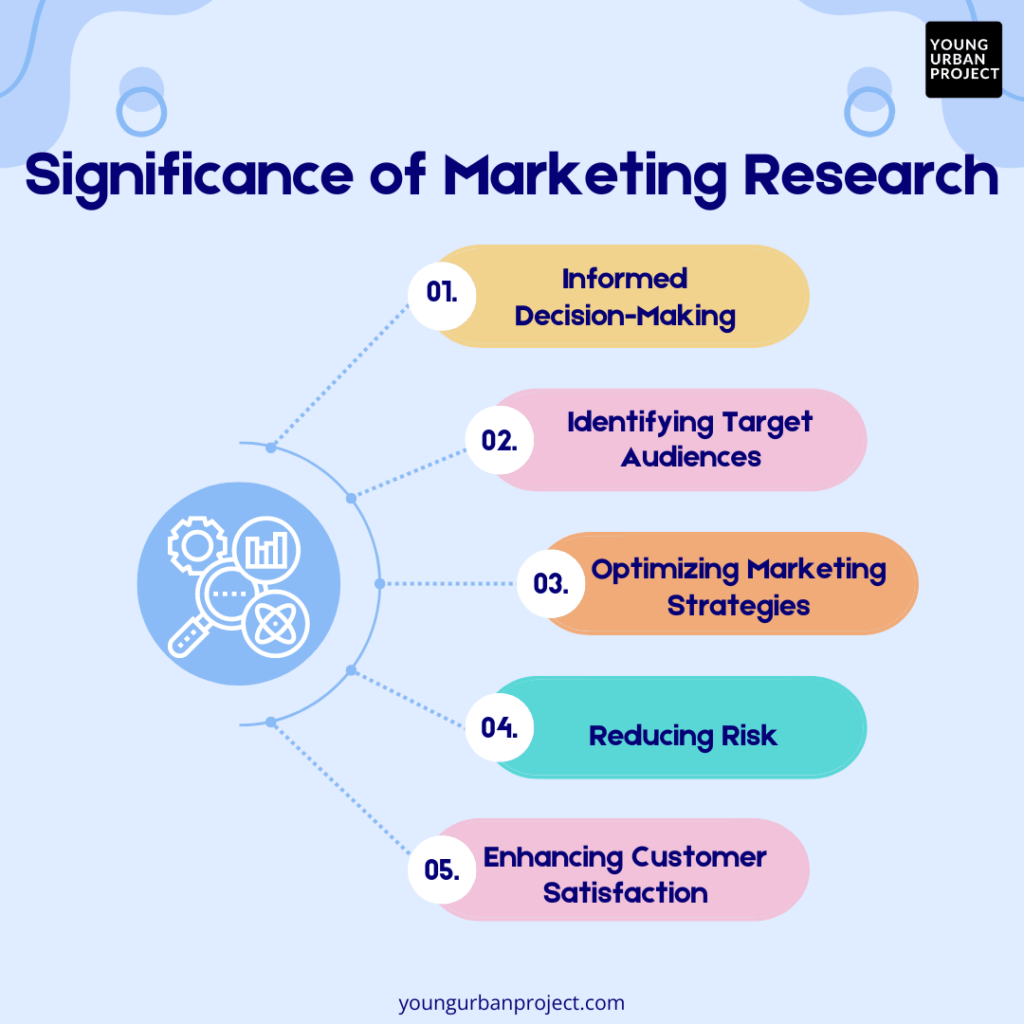Some companies seem to always know exactly what you want, sometimes even before you do? Well, that’s not magic—it’s marketing research at work. Today, the significance of marketing research can’t be overstated. It’s what helps businesses make informed decisions, stay competitive, and ultimately, win over customers.
Table of Contents
What is Marketing Research?
Marketing research involves the systematic gathering, recording, and analysing of data related to marketing products and services. Unlike market research, which focuses on market trends, marketing research is concerned with the strategies and tactics that businesses use to communicate with their target audience. It encompasses a wide range of activities, including understanding customer preferences, evaluating market performance, and assessing the effectiveness of marketing campaigns.
Consider a company launching a new product. Marketing research would help the company understand how to position the product, what messaging would resonate with the target audience, and which channels would be most effective for promotion.
It answers questions like “How effective is our current marketing strategy?” and “What messaging resonates with our target audience?”
The Significance of Marketing Research

1. Informed Decision-Making
One of the primary reasons businesses conduct marketing research is to gather data that informs decision-making. Whether launching a new product, entering a new market, or adjusting a pricing strategy, marketing research provides the evidence-based insights needed to make decisions with confidence. By understanding consumer preferences, market trends, and the competitive landscape, businesses can develop strategies that align with market demands and reduce the likelihood of costly mistakes.
2. Identifying Target Audiences
Understanding who your customers are is critical to the success of any marketing strategy. Marketing research helps businesses identify and segment their target audience based on demographics, psychographics, and behavioral data. This information is vital for creating personalized marketing messages that resonate with specific audience segments, leading to higher engagement and conversion rates.
For example, a company selling luxury goods may use marketing research to identify affluent customers who value exclusivity and quality. By targeting this specific segment with tailored marketing campaigns, the company can increase its chances of success.
3. Optimizing Marketing Strategies
Marketing research is essential for evaluating the effectiveness of marketing strategies and identifying areas for improvement. By analyzing data from various marketing channels—such as social media, email, and search engines—businesses can determine which strategies are working and which need adjustment. This continuous process of optimization ensures that marketing efforts are always aligned with business goals and market conditions.
For instance, if a company’s research reveals that its social media campaigns are generating high engagement but low conversion rates, it may decide to tweak its messaging or target a different audience to improve results.
4. Reducing Risk
Every business decision carries some level of risk. However, marketing research helps mitigate these risks by providing a clearer picture of the market environment. By understanding market trends, consumer behavior, and potential threats, businesses can anticipate challenges and develop strategies to address them proactively.
For example, before launching a new product, a company can conduct marketing research to assess consumer interest, potential competitors, and market demand. If the research indicates a low level of interest or a saturated market, the company may choose to modify the product or delay the launch, thus avoiding potential losses.
5. Enhancing Customer Satisfaction
Customer satisfaction is a key driver of business success. Marketing research helps businesses understand customer needs, preferences, and pain points, enabling them to create products and services that meet or exceed expectations. By regularly conducting surveys, focus groups, and interviews, businesses can gather feedback that informs product development and customer service strategies.
For example, a company may use marketing research to discover that customers are dissatisfied with the level of support they receive after making a purchase. Armed with this insight, the company can invest in training its customer service team or developing self-help resources to improve the overall customer experience.

The Future of Marketing Research
As technology continues to evolve, so does the scope and significance marketing research. The rise of big data, artificial intelligence (AI), and machine learning is transforming how businesses gather and analyze marketing data. These advancements are making marketing research more accurate, efficient, and actionable.
1. Big Data and Predictive Analytics
Big data refers to the vast amounts of data generated by digital devices and online activities. By harnessing big data, businesses can gain deeper insights into consumer behavior and market trends. Predictive analytics, powered by AI and machine learning, allows businesses to forecast future trends and make proactive decisions based on historical data.
For example, a company may use predictive analytics to anticipate changes in consumer demand and adjust its marketing strategies accordingly, ensuring it stays ahead of the competition.
2. AI-Powered Research Tools
AI-powered research tools are revolutionizing the way businesses conduct marketing research. These tools can analyze large datasets quickly and accurately, providing real-time insights that inform marketing strategies. AI can also help businesses automate repetitive tasks, such as data collection and analysis, freeing up time for more strategic activities.
For instance, AI-powered sentiment analysis tools can analyze social media posts, reviews, and surveys to gauge consumer sentiment towards a brand or product. This information can be used to refine marketing messages and improve customer engagement.
3. Customer-Centric Research
As consumers become more empowered and selective, businesses are shifting towards a customer-centric approach to marketing research. This approach focuses on understanding the customer journey and creating personalized experiences that meet individual needs and preferences. By placing the customer at the center of their marketing research efforts, businesses can build stronger relationships and foster brand loyalty.
For example, a company may use customer journey mapping to identify pain points in the purchasing process and develop solutions that enhance the overall customer experience.
Also Read- 12 Limitations of Marketing Research to remember while conducting it
The significance of marketing research cannot be overstated. It is a powerful tool that enables businesses to make informed decisions, reduce risks, and optimize their marketing strategies. By understanding the importance of marketing research and leveraging the latest technologies, businesses can stay competitive in an ever-changing market and achieve long-term success. Whether you’re a small business owner or a marketing professional, investing in marketing research is essential for driving growth and achieving your business objectives.
The competition today is growing, consumer preferences and market conditions are also changing rapidly, so the insights provided by marketing research are more valuable than ever. By adopting marketing research as a core component of your marketing strategy, you can ensure that your business remains agile, customer-focused, and poised for success.
FAQs: Significance of Marketing Research
What is marketing research?
Marketing research involves the systematic collection and analysis of data related to all aspects of marketing, including product development, pricing, promotion, and distribution. It helps businesses understand market trends, consumer preferences, and the effectiveness of marketing strategies.
How does marketing research differ from market research?
While market research focuses specifically on understanding the market, including consumer behavior and competitive landscape, marketing research is broader. It encompasses all aspects of the marketing mix and evaluates the performance of marketing strategies.
Why is marketing research important for businesses?
Marketing research provides critical insights that help businesses make informed decisions, reduce risks, identify growth opportunities, and optimize their marketing strategies to better meet consumer needs.
What are the key components of marketing research?
Key components include product research, pricing research, promotional research, and distribution research. Each component helps evaluate different elements of the marketing mix to enhance business strategies.
How can marketing research improve product development?
Marketing research helps identify consumer needs and preferences, which can guide the development of products that meet market demands. It also uncovers gaps in the market that can be addressed with new or improved products.
In what ways can marketing research optimize pricing strategies?
By analyzing consumer price sensitivity and competitor pricing, marketing research provides insights into optimal pricing strategies that can maximize profitability while remaining competitive.
How does marketing research contribute to effective promotion?
Marketing research evaluates the success of various promotional strategies and channels, allowing businesses to tailor their marketing messages and tactics to effectively engage their target audience.
What role does marketing research play in selecting distribution channels?
It helps identify the most effective distribution channels for reaching the target audience based on their shopping habits and preferences, ensuring products are available where and how consumers want to buy them.
How can businesses leverage marketing research for risk reduction?
Marketing research provides data-driven insights that help anticipate market challenges and consumer responses, allowing businesses to develop strategies to mitigate risks and avoid costly mistakes.
What future trends are shaping the field of marketing research?
Future trends include the use of big data, predictive analytics, AI-powered research tools, and a shift towards customer-centric approaches. These advancements enhance the accuracy and efficiency of marketing research, providing deeper insights and more actionable data.

